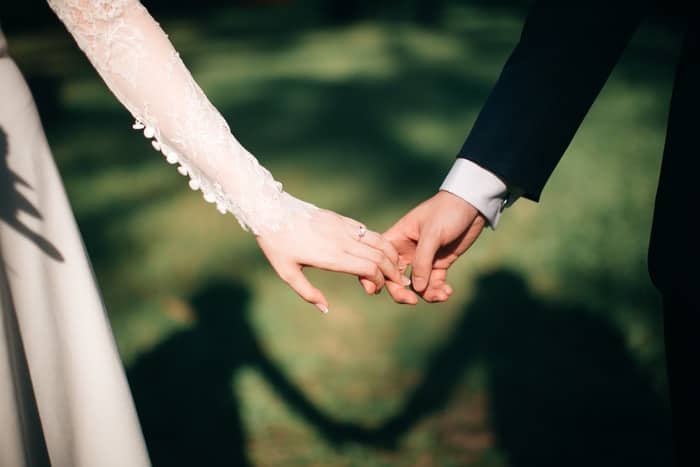As you embark on this beautiful journey together, you may find yourself wondering how long you can officially be considered “newlyweds.” It’s an exciting and thrilling time, filled with love, joy, and new adventures.

But at what point does the newlywed status fade away? In this blog post, we will explore the concept of newlyweds and try to answer the question: How long are you considered newlyweds?
The Duration of Newlywed Status
The duration of newlywed status is a topic that often sparks curiosity among couples and individuals entering married life. Understanding how long you are considered newlyweds can provide insight into the unique phase of marriage characterized by excitement, joy, and adjustment. However, the length of this period can vary depending on cultural perspectives, personal experiences, and societal expectations.
Cultural and Traditional Perspectives
Different cultures and societies have varying norms and traditions when it comes to defining the duration of newlywed status. In some cultures, the newlywed phase is considered to be relatively short, lasting only a few months after the wedding.
On the other hand, there are cultures that extend the newlywed period to encompass the first few years of marriage. Exploring these cultural differences can shed light on the diversity of perceptions and expectations surrounding the newlywed status.
Personal Perception and Experience
While cultural and traditional perspectives provide a broader framework, personal perception plays a significant role in how long an individual or couple considers themselves to be newlyweds. The newlywed experience can be subjective, influenced by various factors such as individual personalities, relationship dynamics, and the level of commitment and connection between partners. Some couples may feel the newlywed bliss fading after a few months, while others may maintain the newlywed mindset for a longer duration.
Navigating the first year of marriage is often seen as a pivotal period for newlyweds, characterized by both the honeymoon phase and adjustments to married life. Understanding the dynamics of this crucial time can provide valuable insights into the duration of newlywed status.
The Honeymoon Phase
The initial months of marriage are often referred to as the honeymoon phase. This stage is marked by intense romance, passion, and a sense of euphoria. Newlyweds may feel deeply connected to their partner, with a heightened sense of excitement and joy. During this time, the newlywed status is at its peak, as the couple basks in the glow of their recent wedding and the start of their life together.
Adjustments and Challenges
While the honeymoon phase is filled with love and happiness, the first year of marriage also brings adjustments and challenges. Newlyweds must navigate the transition from single to married life, which can involve merging finances, sharing living spaces, and building routines together. Adjusting to these changes can sometimes lead to conflicts and disagreements. Successfully overcoming these challenges contributes to the growth and strengthening of the marital bond.
By exploring the factors that influence the length of newlywed status, couples can gain a deeper understanding of their own journey. The passage of time since the wedding and the occurrence of significant milestones and life events can all shape the duration of this unique phase.

Time Since the Wedding
The length of time that has passed since the wedding is often used as a marker for determining how long a couple remains in the newlywed stage. While there are no hard and fast rules, it is common for the intensity of the newlywed phase to gradually diminish over time. The excitement and novelty of being newly married may naturally fade as couples settle into their routines and face new challenges together.
Milestones and Life Events
Significant milestones and life events can also impact the duration of the newlywed status. Celebrating milestones as a couple, such as buying a house, starting a family, or reaching career goals, can mark a transition into the next phase of marriage. These milestones bring new responsibilities and priorities, often shifting the focus from the newlywed stage to building a more established life together.
Understanding when the newlywed phase ends can be subjective and varies from person to person. It depends on individual perspectives, societal expectations, and personal desires. The end of the newlywed phase is not necessarily a negative occurrence but rather a natural progression into the next stage of marriage.
Different Perspectives on Newlywed Expiration
Society often imposes expectations regarding the expiration of the newlywed phase, suggesting that it lasts for a specific duration. However, it is essential for individuals and couples to define the end of the newlywed stage for themselves, based on their own experiences, feelings, and desires. This empowers couples to embrace their unique journey and allows them to transition into the next phase of marriage at their own pace.
Embracing the Next Stage of Marriage
While bidding farewell to the newlywed stage may evoke mixed emotions, it also signifies growth, depth, and stability in a marriage. Couples can embrace the next stage of marriage by focusing on building a strong foundation, nurturing their relationship, and continuing to create beautiful memories together. The newlywed spirit can be preserved by cherishing the love and connection that brought them together initially while embarking on new adventures as a married couple.
The First Year as Newlyweds
The first year of marriage is a significant and transformative period for newlyweds. It is a time filled with excitement, growth, and adjustment as couples navigate the initial stages of their life together.
The first year encompasses the honeymoon phase, characterized by intense romance and bliss, as well as the challenges and adjustments that come with merging two lives into one. Understanding the dynamics of this crucial time can provide valuable insights into the unique experience of being newlyweds.
The Honeymoon Phase
The honeymoon phase is often considered the pinnacle of newlywed bliss. During this stage, couples bask in the euphoria of their recent wedding and the beginning of their life together as a married couple. It is a time characterized by heightened romance, passion, and a profound sense of connection.
The honeymoon phase may involve traveling, celebrating, and reveling in the joy of being newly married. The couple’s love and affection for each other are at their peak, creating a magical and unforgettable experience.
Adjustments and Challenges
While the honeymoon phase is filled with love and happiness, the first year of marriage also brings its share of adjustments and challenges. Newlyweds must navigate the transition from single life to married life, which involves merging individual routines, habits, and expectations. It requires open communication, compromise, and a willingness to adapt to each other’s needs.
Adjusting to sharing living spaces, financial responsibilities, and decision-making can sometimes lead to conflicts and disagreements. However, these challenges also provide opportunities for personal growth, strengthening the bond between partners, and establishing a solid foundation for the future.
Nurturing the Marital Relationship
The first year as newlyweds is a crucial time for nurturing the marital relationship. Couples can prioritize building a strong emotional connection, fostering effective communication, and deepening their understanding of each other.
This involves actively listening to one another, expressing appreciation, and regularly engaging in meaningful conversations. Setting aside quality time for shared activities, date nights, and creating new traditions can help maintain the spark and strengthen the marital bond.
Establishing Shared Goals and Values
During the first year, newlyweds have an opportunity to establish shared goals and values for their future together. They can discuss their dreams, aspirations, and the direction they envision for their marriage. This involves aligning their individual goals and finding common ground to build a shared vision. By establishing shared values and aspirations, couples can create a strong sense of unity and purpose in their marriage.
Seeking Support and Guidance
The first year of marriage can be a time of significant adjustment and learning. It is important for newlyweds to seek support and guidance when needed. This can include seeking advice from trusted family members, friends, or mentors who have experience in successful marriages.
Additionally, couples may choose to attend premarital counseling or workshops to enhance their communication skills, resolve conflicts, and gain insights into building a healthy and fulfilling marriage.

Factors Influencing the Length of Newlywed Status
The length of newlywed status can vary from couple to couple, influenced by a combination of factors that shape the trajectory of their marriage. While there is no fixed duration for the newlywed phase, certain elements can impact how long couples consider themselves to be in this stage.
These factors include the time since the wedding and the occurrence of significant milestones and life events. By understanding these influences, couples can gain insight into the duration of their newlywed status and embrace the natural progression of their relationship.
Time Since the Wedding
The duration of newlywed status is often tied to the time that has elapsed since the wedding. In the early months, the newlywed phase may be characterized by an intense sense of excitement, romance, and adjustment. As time goes on, this initial euphoria may subside, and couples may find themselves settling into a more established rhythm of married life.
While there are no strict guidelines, many couples tend to perceive themselves as newlyweds for the first year or two after their wedding. However, the exact timeframe can vary based on individual experiences, personal expectations, and cultural influences.
Milestones and Life Events
Significant milestones and life events can also influence the length of the newlywed status. These milestones can include both personal and shared achievements, such as purchasing a home, starting a family, or reaching career goals. Each milestone introduces new dynamics and responsibilities that may shift the focus from the initial newlywed phase.
As couples navigate these milestones, their sense of identity and priorities may evolve, leading to a natural transition into the next phase of their marriage. Celebrating these milestones together helps mark the progression of the relationship and shape the perception of the newlywed status.
Personal Growth and Development
The personal growth and development of each individual within the marriage can also impact the duration of the newlywed status. As individuals mature and evolve, their perspectives, priorities, and needs may shift. This growth can influence how they perceive their role as a newlywed and how they define their identity within the marriage.
Couples who actively invest in personal growth, both as individuals and as a couple, may experience a sense of progression and transition from the newlywed phase to a more mature stage of their relationship.
Cultural and Social Influences
Cultural and social factors can play a significant role in shaping the length of the newlywed status. Different cultures and societies may have varying expectations and traditions surrounding the newlywed phase. Some cultures may emphasize a shorter duration, while others may extend the newlywed status over several years.
Social influences, such as media portrayals and societal norms, can also impact individuals’ perceptions of how long they should consider themselves as newlyweds. It is essential for couples to navigate these influences while staying true to their own values and desires.
Personal Perspectives and Desires
Ultimately, personal perspectives and desires are crucial factors in determining the length of the newlywed status. Each individual and couple has their own unique experiences, expectations, and aspirations for their marriage.
It is important to have open and honest conversations with one another to understand each other’s viewpoints and desires regarding the newlywed phase. By aligning their personal perspectives and desires, couples can define the duration of the newlywed status that feels most authentic and fulfilling to them.
Conclusion
In conclusion, the duration of being considered newlyweds is subjective and can vary from couple to couple. While some may argue that the label of “newlyweds” should only apply to the first few months or a year of marriage, others believe that the newlywed phase can extend for a longer period, even up to three years. Ultimately, it’s up to you and your partner to decide when you feel you have transitioned from being newlyweds to a more established married couple.










